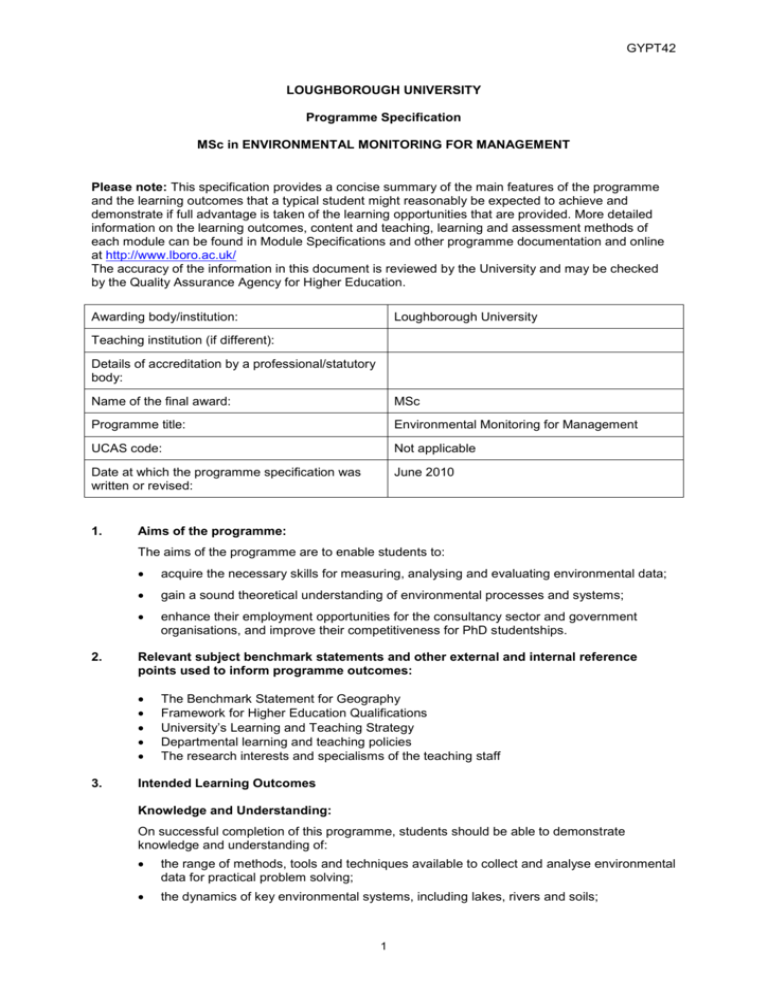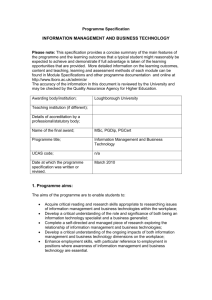LOUGHBOROUGH UNIVERSITY
advertisement

GYPT42 LOUGHBOROUGH UNIVERSITY Programme Specification MSc in ENVIRONMENTAL MONITORING FOR MANAGEMENT Please note: This specification provides a concise summary of the main features of the programme and the learning outcomes that a typical student might reasonably be expected to achieve and demonstrate if full advantage is taken of the learning opportunities that are provided. More detailed information on the learning outcomes, content and teaching, learning and assessment methods of each module can be found in Module Specifications and other programme documentation and online at http://www.lboro.ac.uk/ The accuracy of the information in this document is reviewed by the University and may be checked by the Quality Assurance Agency for Higher Education. Awarding body/institution: Loughborough University Teaching institution (if different): Details of accreditation by a professional/statutory body: Name of the final award: MSc Programme title: Environmental Monitoring for Management UCAS code: Not applicable Date at which the programme specification was written or revised: June 2010 1. Aims of the programme: The aims of the programme are to enable students to: 2. acquire the necessary skills for measuring, analysing and evaluating environmental data; gain a sound theoretical understanding of environmental processes and systems; enhance their employment opportunities for the consultancy sector and government organisations, and improve their competitiveness for PhD studentships. Relevant subject benchmark statements and other external and internal reference points used to inform programme outcomes: 3. The Benchmark Statement for Geography Framework for Higher Education Qualifications University’s Learning and Teaching Strategy Departmental learning and teaching policies The research interests and specialisms of the teaching staff Intended Learning Outcomes Knowledge and Understanding: On successful completion of this programme, students should be able to demonstrate knowledge and understanding of: the range of methods, tools and techniques available to collect and analyse environmental data for practical problem solving; the dynamics of key environmental systems, including lakes, rivers and soils; 1 GYPT42 how environmental data informs management of environmental systems. Teaching, learning and assessment strategies to enable outcomes to be achieved and demonstrated: The programme is delivered by a wide range of teaching and learning strategies, including lectures, fieldwork (one-day field visits and residential field trips), laboratory practicals (for analysis of water, soil, sediment and invertebrate samples), computer practicals (for manipulation of environmental data using specialised software) and one-to-one tutorials (for advice on assignments, including dissertation supervision). To emphasise the applied element of the programme, some sessions will be delivered by practitioners from public and private agencies. Students are required to work individually (researching, preparing coursework assignments and conducting the dissertation) and also in groups (fieldwork and practicals). Students are provided with handbooks on departmental procedure, programme syllabus, and module handbooks giving details of lectures, field work, practicals, study guidelines, guided reading, assignments and assessment. Assessment is by a combination of coursework assignments, which may include presentations, written assignments, computer-based assignments and class tests, end of module examinations and a dissertation. All assessment is commented upon critically and constructively in marking so as to help students develop their understanding and progress intellectually through the stages of the programme. Skills and other attributes: a. Subject-specific intellectual skills: On successful completion of this programme, students should be able to: select, execute and evaluate research methodologies in environmental sciences; critically assess the theories and concepts pivotal to understanding environmental dynamics and systems; critically interpret data to make scientifically rigorous arguments; successfully complete an original piece of research on environmental dynamics, dovetailing both theoretical rigor and data analysis (dissertation). Teaching, learning and assessment strategies to enable outcomes to be achieved and demonstrated: Modules will be taught by leading researchers in the Department of Geography who will draw upon their expertise and experience to inject a practical understanding of how research should be conducted. Most of the teaching and learning will have a dominant practical emphasis, focussing on research design and methodologies, qualitative and quantitative data analysis, and application of research results for practical problem solving in environmental management. Coursework assignments are designed to give students the opportunity to exhibit their research and data analysis skills, and demonstrate how their knowledge of research methodologies connects with issues of environmental management research practice. They have also been designed to maximise students’ opportunity to demonstrate their appreciation of the issues involved in implementing different research methods. Assessment of intellectual and cognitive skills such as critical reasoning is combined with assessment of knowledge and understanding. b. Subject-specific practical skills: On successful completion of this programme, students should be able to: understand the merits and limitations of different research methods; deploy a variety of instruments to collect environmental data in the field; conduct a qualitative assessment of environmental systems through observation; use laboratory equipment and techniques to analyse environmental data; 2 GYPT42 use analytical software tools (SPSS, Matlab, ERDAS); evaluate secondary environmental data sources, including web-based material; synthesise research results and, if appropriate, recommend management policy; interpret, write-up and present quantitative and qualitative data. Teaching, learning and assessment strategies to enable outcomes to be achieved and demonstrated: Students will gain experience of collecting, analysing and interpreting environmental data through assessed coursework projects based on fieldwork and practicals. These projects are designed to explore the way that different methods can be used to answer specific research questions aimed at informing environmental management. Students will learn how to characterise the state of the environment (e.g. soil chemistry, beach morphology, aquatic habitat), to quantify environmental fluxes (e.g. sediment transport rates, river discharge) and analyse these data using a range of laboratory, numerical and statistical tools and techniques. Students are advised on accessing library materials and using the Internet as a source of secondary data. SPSS, Matlab, ERDAS and other analytical software tools are taught in practical workshops. Practical skills such as designing research methodologies, deployment of equipment for collecting environmental data and the application of tools for data analysis are assessed in relation to assessment of knowledge and understanding. c. Key/transferable skills: On successful completion of this programme, students should be able to: work effectively in individual study and in teams; manage time effectively; problem solve and analyse numerical data from a variety of sources; identify, retrieve, sort and exchange relevant information from conventional and on-line sources; cost and plan the resource allocation for a research proposal; evaluate the risks involved in collecting environmental data and develop mitigation strategies to reduce this risk; effectively assimilate and communicate material of a technical nature in written, oral and visual form; use IT (WWW, word-processing, spread sheets, graphics). Teaching, learning and assessment strategies to enable outcomes to be achieved and demonstrated: All of the above are developed throughout the programme via a combination of fieldwork experience, laboratory and computer practicals, and assessed coursework (including the dissertation proposal, dissertation, research reports, essays and presentations). Coursework requirements are designed to encourage recognition of time management, the development of collaborative skills through group work, independent study and communicating effectively through written and graphical form. Transferable skills, which are especially important for employability, are assessed in relation to intellectual and practical skills, knowledge and understanding. 4. Programme structures and requirements, levels, modules, credits and awards: Full details can be found in the programme regulations at http://www.lboro.ac.uk/admin/ar/lps/progreg/year/1112/index.htm 3 GYPT42 The programme is available as either a 12-month full-time course of study or a 24-month parttime course of study. The programme is divided in to units of study called modules, which carry credit weightings in multiples of 10 (usually, 10 or 20 but with the Dissertation module carrying a credit weighting of 60). Students are required to register for modules with a total modular weight of 180. All Geography modules are compulsory and, although attached to a semester, operate on an 11-week termly basis so that the summer term can be largely devoted to work on the Dissertation module. 5. Criteria for admission to the programme: A typical offer would be an undergraduate degree at upper second class honours in geography or cognate subject (e.g. environmental science, management or engineering, biology, oceanography, archaeology, geology, ecology) though other applicants will be given due consideration. Further information is available at http://www.lboro.ac.uk/departments/gy/postgraduates/env.html 6. Information about assessment regulations: To be eligible for the award of MSc, students must accumulate at least 160 credits from 180 modular weights and not less than 40% in the remaining module(s). Without credit in the Dissertation module, students may be eligible for award of either PGCert or PGDip. Full details can be found in the official Programme Regulations (see 4. above) and the University’s Regulation XXI at http://www.lboro.ac.uk/admin/ar/calendar/regulations/current/21/index.htm 7. What makes the programme distinctive: The Department of Geography is fully committed to excellence in teaching and research and to ensuring that there is close interaction between the two. Much of our research has been judged to be world leading. A thorough and ongoing programme of peer-based teaching observation, curriculum review and modular evaluation operates. Further information is available at http://www.lboro.ac.uk/departments/gy/postgraduates/env.html 8. Particular support for learning: Details of University learning support services can be found at http://www.lboro.ac.uk/admin/ar/templateshop/notes/lps/index.htm 9. Methods for evaluating and improving the quality and standards of learning: Details can be found at http://www.lboro.ac.uk/admin/ar/templateshop/notes/lps/index.htm 4







